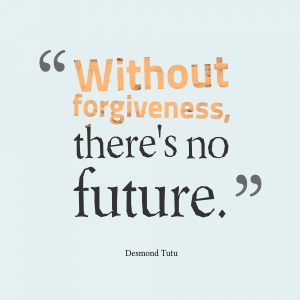Want a Future? Choose Forgiveness, Not Fighting
By Jamie C. Williamson, PhD
My friend Mike confided to me yesterday that he and his wife of over 20 years are getting a divorce. Although the split was her idea, he was quick to choose to forgive her and focus on building a stable future for himself, his wife, and their children. 
He told me he thought it all through carefully. He said he understood that even though he was content in their marriage, no amount of effort or counseling could put the joy back in their marriage for her. Something was missing for her that he knew he could not provide. And, he quoted Desmond Tutu saying “Without forgiveness, there’s is no future.”
This is a very mature, evolved perspective. And, I wanted to check if it was real. So, I asked “what about you and your feelings”? You’re giving up a life that made you happy…a life that once made her happy…so that she can build a different kind of happiness without you. Aren’t you hurt? Angry? Sad?
And, Mike explained:
Even after all this time to get used to the idea, I am quite sad over the family life I am losing and I want to make sure my kids hurt as little as possible. And, I’ll admit I felt angry at first. I wanted to hurt her. I wanted her to beg me to forgive her. But, I quickly realized I was more in shock, than angry.
So, I stopped reacting and started to truly listen to her explanation, which she patiently provided a few times. Then I made myself think about our marriage from her perspective. About my own role in the deterioration of our romantic side. I thought about the opportunities for happiness she could have in a different life. And, I got it. I truly did. After that, it was easy for me to tell her that I forgive her and to focus on solutions that worked for both of us, and our kids.
Why did forgiveness come so easy for Mike?
I know Mike pretty well. He has strong spiritual beliefs that require him to turn the other cheek. He also ranks high in his ability to take another person’s perspective. He can feel and express empathy. And, he still cares about his soon-to-be X-wife, so he doesn’t want to try to make her feel worse than she already does. In fact, he wants to help her save-face, so she feels less guilty and can regain happiness more quickly.
Mike also knows the value forgiveness plays in preserving a relationship. He knows he and his wife will not be able to be good co-parents, if they do not forgive one another.
 In the end, forgiveness is a choice.
In the end, forgiveness is a choice.
A choice not to fight.
A choice not to hold a grudge.
A choice to surrender your pride to obtain peace. In the end, waving the white flag of surrender, is a sign of maturity and strength, not submission and weakness.
What makes forgiveness difficult for some people?
People who generally find it hard to forgive others include (1) people with a fairly low self-esteem who build themselves up by viewing the other’s mistakes as much worse than their own and (2) people who are cognitively immature and have an underdeveloped sense of empathy.
But, even the most empathic and developmentally mature among us have to remind ourselves about the importance of forgiveness when the transgression is quite severe, has occurred too often, or is likely on-going – especially when the transgressor has not sincerely apologized.
(If you are seeking forgiveness, you may want to read “Effective Apologies Turn Conflict Aftermath into Healing Afterglow” to learn the five key attributes of an effective apology.)
There also is a common tendency, called the Fundamental Attribution Error, that makes people view other’s mistakes as due to internal causes like their personality or character traits. In Mike’s case, he could have said his wife’s falling out of love with him was caused by her “her lack of ability to keep her promises”, “her selfishness”, or “her overly romantic idea of what long-term married life is like”.
These are harsh judgments that would have made it difficult, if not impossible, for Mike to forgive his wife and preserve a friendly relationship with her.
The flip side of the Fundamental Attribution Error makes it even more difficult.
Instead of assuming that our own mistakes are caused by our character or personality traits, we explain away our mistakes by attributing them to external causes like situational factors or life circumstances. In Mike’s case, he would say “I was only inattentive because I had to work such long hours”, “It just the aging process” or “The guys count on me”.
These explanations allow Mike to let himself off the hook, rather than take responsibility for his part in the deterioration of his marriage. Both sides of the Fundamental Attribution Error combined allow Mike to blame his wife and absolve himself. To judge her harshly, rather view her through empathetic eyes. To self-righteously hold a grudge, rather than forgive.
Fortunately, Mike quickly reframed his attributions and listened carefully to his wife’s concerns. He surrendered his pride and obtained an empathic perspective. As a result, he and his wife have maintained a peaceful relationship as they try to reach agreement on important issues and build a stable future for themselves and their children, rather than keep rehashing the past.
Please give the Fundamental Attribution Error some thought. Is this common tendency prohibiting you and your partner from forgiving each other, preserving a friendly relationship, and having a happy future?
If so, share this post with your partner (or anyone else you’re struggling with) and suggest that you both give forgiveness a try.
Surrender your pride. Choose not to fight. Not to hold a grudge.
Choose forgiveness.
Then, start to Work it Out. Even if you are headed for divorce, you can make it a friendly one. But, if you want to stay together, choosing forgiveness is necessary. Without forgiveness, there is little hope for a happy future together.
Let me know if I can help.
You’ll find me at Amity Mediation Workshop, where we facilitate divorce, family and civil mediations. We also use the Gottman Relationship Checkup as we conduct transformative, psycho-educational Marriage Refresher Courses for our clients who want to stay together and restore the joy in their marriage.
If you liked this blog post, SIGN UP NOW for my “Work it Out – Relationship Tips” emails packed with practical, helpful, and fun relationship guidance that you can really use to help your relationship work.